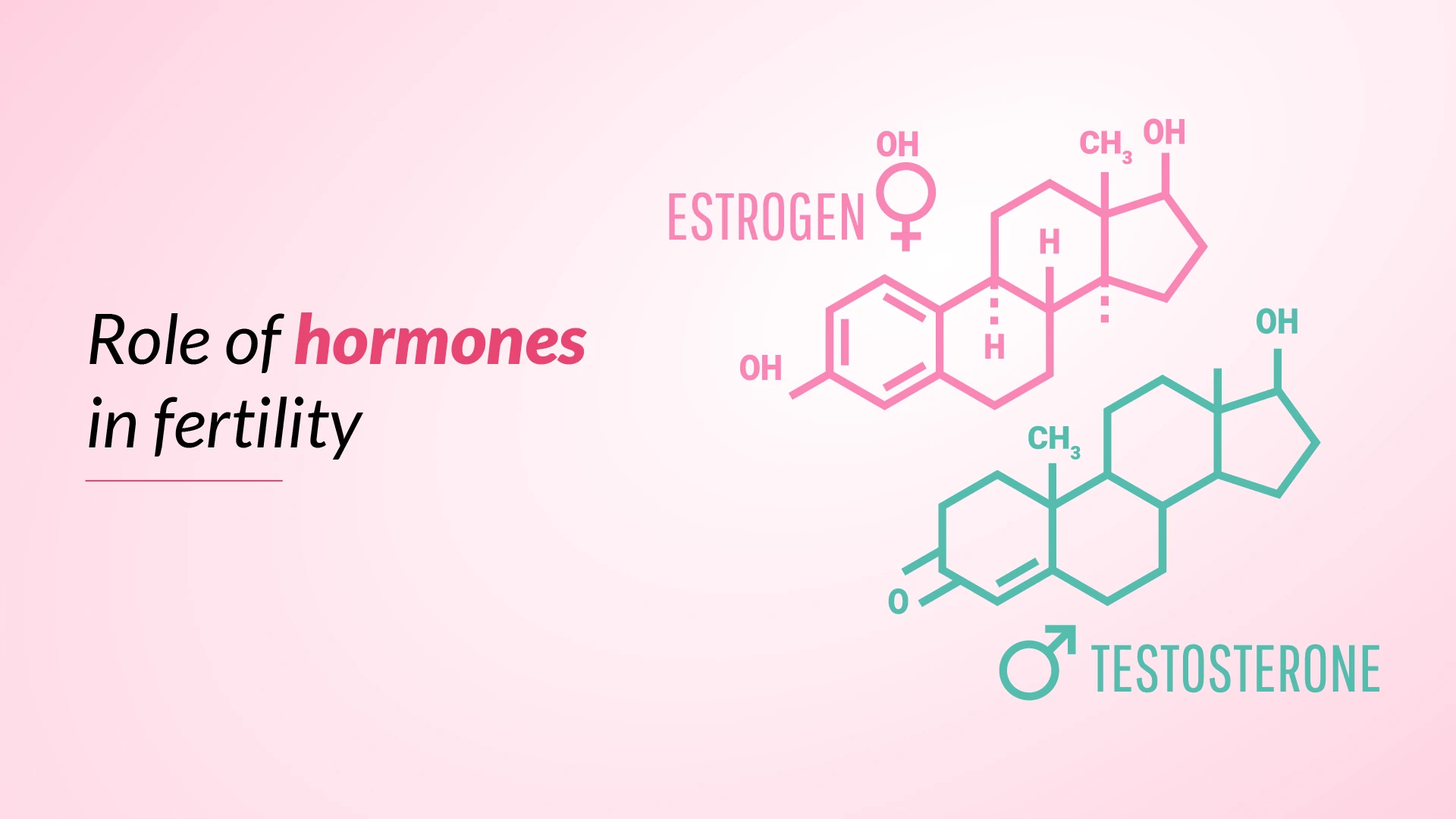Hormones play a pivotal role in regulating fertility in both men and women. These are chemical messengers which are produced by various glands in the body. The hormones work together in a delicate balance and ensure the proper functioning of the body. Understanding the importance of hormones in fertility is crucial for individuals seeking to conceive or maintain reproductive health.
Types of Hormones in Fertility
There are several key hormones involved in fertility, each with its unique functions:
- Gonadotropins: These hormones (Follicle-stimulating Hormone (FSH) and Luteinising Hormone (LH)) are synthesised by the pituitary gland and regulate the development and release of eggs (in women) and sperm production (in men).
- Sex Hormones: Estrogen, progesterone & testosterone are the primary sex hormones involved in fertility. Estrogen and progesterone are essential for female reproductive health, while testosterone plays a crucial role in male fertility.
- Thyroid Hormones: These hormones, such as thyroxine (T4) and triiodothyronine (T3), regulate metabolism and can impact fertility by influencing ovulation and sperm production.
Suggested read: How one’s thyroid can impact one’s fertility?
- Prolactin: This hormone, synthesised by the pituitary gland, plays an elementary role in breast milk production and can also affect fertility if levels are too high or too low.
Suggested Read: Tips for Improving Egg Quality in Female Infertility Treatment
Functions of Fertility Hormones
Fertility hormones work in a complex interplay and ensure the proper functioning of the reproductive system. Some of their key functions include:
- Regulating the menstrual cycle in women
- Stimulating the development and release of eggs (ovulation)
- Preparing the uterine lining for implantation
- Promoting sperm production and maturation in men
- Maintaining the balance of reproductive organs
Hormones and Female Fertility
Female Hormones and Functions
The primary hormones involved in female fertility are:
- Estrogen: Produced by the ovaries, estrogen plays a vital role in egg development & maturation. It also helps to prepare the uterine lining for implantation and supports early pregnancy.
- Progesterone: This hormone, also generated by the ovaries, helps to maintain the uterine lining during the second half of the menstrual cycle. It also plays a vital role in making the body ready for pregnancy.
- Follicle-stimulating Hormone (FSH): Synthesised by the pituitary gland, FSH improves the growth and development of follicles (fluid-filled sacs containing eggs) in the ovaries.
- Luteinising Hormone (LH): This pituitary hormone triggers ovulation (egg release from the ovary) and plays an elementary role in the synthesis of estrogen & progesterone.
Impact of Hormone Imbalance on Women
Hormone imbalance in women can significantly impact female fertility. Polycystic ovary syndrome (PCOS), thyroid disorders, and pituitary gland problems can disrupt the delicate balance of hormones, leading to irregular menstrual cycles, anovulation (lack of ovulation), and difficulty conceiving.
Hormones and Male Fertility
Male Hormones and Functions
The key hormones involved in male fertility are:
- Testosterone: Produced primarily by the testes, testosterone is essential for sperm production, maturation, and male sexual function.
- Follicle-Stimulating Hormone (FSH): This pituitary hormone stimulates sperm production in the testes.
- Luteinising Hormone (LH): LH plays a role in testosterone production by the testes, which is crucial for sperm production and maturation.
Impact of Hormone Imbalance on Men
Hormonal imbalances in men can result in fertility issues. Low testosterone levels can result in reduced sperm production and quality. Conditions such as hypogonadism (low testosterone production) and pituitary gland disorders can disrupt the hormonal balance, affecting male fertility.
Role of Hormones in Female Fertility
Regulation of Menstrual Cycle
Hormones are vital in regulating the menstrual cycle, which is essential for female fertility. The interplay between hormones like estrogen, progesterone, FSH, and LH orchestrates the various stages of the cycle, including:
- Follicular Phase: FSH betters the growth and development of follicles in the ovaries, leading to the maturation of an egg.
- Ovulation: A surge in LH triggers the release of the mature egg from the ovary, marking the onset of ovulation.
- Luteal Phase: After ovulation, the ruptured follicle becomes the corpus luteum. The corpus luteum synthesises progesterone to prepare the uterine lining for implantation.
Follicle Development
FSH plays a vital role in developing follicles, which contain the eggs. Proper follicle development is essential for the production of healthy eggs and successful ovulation.
Uterine Lining Preparation
Estrogen and progesterone work together to prepare the uterine lining (endometrium) for implantation. The estrogen hormone function is to activate the growth and thickening of the endometrium, while progesterone helps maintain and stabilise it during the luteal phase.
Balance of Reproductive Organs
Hormones help maintain the balance and proper functioning of various reproductive organs, including the ovaries, uterus, and fallopian tubes. This hormone balance is crucial for successful conception and implantation.
Support of Early Pregnancy
After conception, hormones like progesterone and human chorionic gonadotropin (hCG) play essential roles in supporting the early stages of pregnancy. Progesterone helps to maintain the uterine lining, while hCG signals the continuation of the corpus luteum’s function.
Hormonal Imbalance and Infertility
Hormonal imbalances can contribute to various fertility issues in women, including:
- Anovulation (lack of ovulation)
- Irregular menstrual cycles
- Polycystic ovary syndrome (PCOS)
- Endometriosis
- Premature ovarian failure
- Luteal phase defect
Addressing hormonal imbalances through lifestyle changes, medications, or assisted reproductive technologies may help improve fertility in some cases.
Suggested Read: Understanding The Role Of Hormonal Imbalances In Female Infertility
Role of Hormones in Male Fertility
Understanding the Hormonal Balance
In men, the hormonal balance is crucial for maintaining proper reproductive function. The pituitary gland, hypothalamus, and testes work together in a delicate feedback loop to regulate hormone levels.
Testosterone Helps in Sperm Production
Testosterone is the primary male sex hormone. It is vital for sperm production & maturation. Testosterone stimulates the development of sperm cells in the testes and supports the overall male reproductive system.
Prolactin’s Impact on Male Fertility
While prolactin is primarily associated with breast milk production in women, it can also affect male fertility. High prolactin levels can suppress testosterone production and impair sperm production.
Thyroid Hormones and Reproductive Health
Thyroid hormones, such as T3 & T4, regulate metabolism and can indirectly impact male fertility. Thyroid disorders, like hypothyroidism or hyperthyroidism, can disrupt the hormonal balance and affect sperm production and quality.
Follicle-stimulating hormone and Spermatogenesis
FSH is produced in the pituitary gland. It stimulates the production of sperm cells (spermatogenesis) in the testes. Adequate levels of FSH are essential for maintaining normal sperm production and quality.
Luteinising Hormone and Testosterone Regulation
LH plays a vital role in regulating testosterone production in the testes. Imbalances in LH levels can lead to abnormal testosterone levels. Abnormal levels can impact sperm production and male fertility.
Conclusion
Hormones are the key players in the intricate dance of fertility for both men and women. A delicate balance of these chemical messengers is an essential component required for the healthy functioning of the reproductive system, from ovulation and sperm production to implantation and early pregnancy support. Understanding the roles of various hormones in fertility can help individuals identify potential imbalances and seek appropriate interventions to improve their chances of conceiving. By adopting healthy lifestyle habits, managing stress levels, and seeking medical guidance when necessary, couples can optimise their hormonal balance and increase their chances of achieving their fertility goals.





























